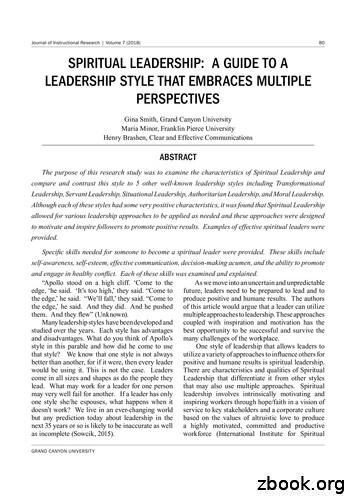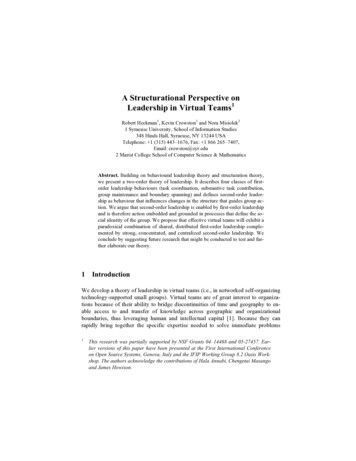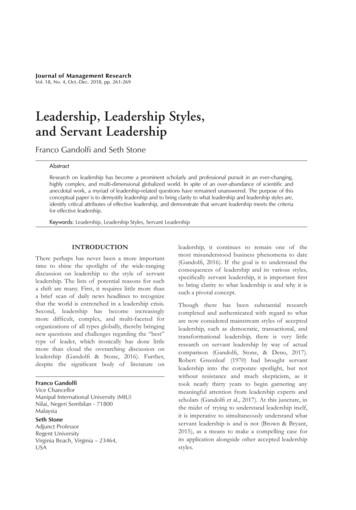Promoting Growth And Leadership In VHA Peer Specialist .
Promoting Growth and Leadership inVHA Peer Specialist Professional Development:Continuing Education & Participation in Organizational ActivitiesPatricia Sweeney, Psy.D., CPRPNew England MIRECC Peer Education Center
Expected Competency Areas forfor VHA Peer Support Staff Recovery PrinciplesPeer Support PracticesCultural CompetenceCommunicationRecovery & Personal Wellness GoalsWhole Health Approach to ServicesManaging Crisis and EmergencySituations CommunityIntegration/Reintegration Group Facilitation Advocacy Use of Recovery Tools Workplace Skills Professional DevelopmentThe complete list of expected knowledge and skill areas can be found on the VHAPeer Support Services SharePoint in the “Training” %20Staff%20Competencies.pdf.VETERANS HEALTH ADMINISTRATION
Related VHA Peer Support Staff CompetenciesHere are some of the expected knowledge and skills for peer specialists in VHAthat are related to workplace skills and professional development.Workplace Skills Domain Participates as an active member ininterdisciplinary team discussions. Maintains appropriate professionalboundaries with Veterans, Veterans’families, and colleagues. Completes documentation by requireddeadlines. Demonstrates capability in effectivelydealing with conflict and difficultinterpersonal interactions in the workplace. Demonstrates effective communication skillsand professionalism in use of technologies(ex. phone, email).VETERANS HEALTH ADMINISTRATIONProfessional Development Domain Keeps current with emerging knowledgerelevant to recovery practices and shares thisknowledge with colleagues and Veterans. Participates in continuing education activitiesto meet annual training requirements andmaintain the peer specialist certification. Uses supervision (mentoring, reflection)effectively by monitoring oneself and the peerspecialist’s work relationships with others,preparing agendas for the meetings, andaddressing problems by engaging in solutionoriented discussions with the supervisor.
Resource for VHA Peer Support Staff: Training ManualsDownload training manuals from the VHA Peer Support Services .aspx?RootFolder FTraining&FolderCTID 0x0120007ED8487946EC4541ABCE3721142E15E8&View {008B4700-3813-41FD-B0B1-0C15380837B0}.VETERANS HEALTH ADMINISTRATION
VHA Policies Regarding Certification &Continuing Education Requirements for Peer Support Staff VHA policy requires that all peer support staff members receive their peerspecialist certification which they can either obtain through a state-approvedcertification training program prior to their employment or through successfulparticipation the VHA-contracted peer specialist certification training programafter being hired. Current VHA policy requires that all peer support staff obtain 15 hours ofcontinuing education units (CEUs) every year (VHA Handbook 1163.05, p. 7).In the future, the VHA policy requirement may be reduced to 12 hours peryear which is pending approval from VHA central administration offices. If a VHA peer specialist obtained his/her certification through a stateapproved certification training program, the peer specialist is also required toabide by that training organization’s CEU requirements to maintain thecertification.VETERANS HEALTH ADMINISTRATION
Responsibilities of VHA Peer Support Staff It is the responsibility of all VHA peer support staff members tomaintain all VHA required hours of CEUs each year as well as anyadditional CEUs required by the certification organization to maintaintheir certification as peer specialists. It is the peer support staff members’ responsibility to ensure that allsupporting documentation (ex. training certificates) are given to theirsupervisors as well as any other party that needs to keep track of theCEU information each year.VETERANS HEALTH ADMINISTRATION
Find a Mechanism to Track VHA Peer Support Staff’s CEUsExample Continuing Education Tracking FormTitle of PresentationDate(s) of PresentationVETERANS HEALTH ADMINISTRATIONLocation of PresentationNames of Presenter(s)Number of CEUs Awarded
Models for Obtaining Continuing Education &Continued Professional Growth as a Peer SpecialistThere are many ways that you can obtain further training and opportunities forongoing professional development as a VHA peer specialist1. Attend formal trainings in and outside of VHA. Conferences Local VHA facility presentations Trainings on the Department of Veterans Affairs Talent Management System (TMS)website: https://www.tms.va.gov/learning/user/login.jsp Webinars2.Participate in mutual learning opportunities with other peer supportstaff at your local VHA facility and/or within the VISN.3.Pursue professional development opportunities to be a presenter and/orworkgroup participant in and/or outside of VHA.VETERANS HEALTH ADMINISTRATION
Model #1 for Continuing Education:Attend Conferences & Local VHA Facility Presentations Examples of National Conferences with Peer Support-Related Topics: International Association of Peer Supporters (iNAPS) Annual Conference: http://inaops.org/. National Alliance on Mental Illness (NAMI) Annual n convention. Psychiatric Rehabilitation Association Annual . VHA Peer Specialist Conference Examples of VHA Presentations: VISN-wide conference or webinar for VHA staffLocal VHA facility Grand Rounds or Schwartz RoundsLocal VHA facility conferenceVETERANS HEALTH ADMINISTRATION
Model #1 for Continuing Education:Attend Free Webinars or Online Courses Depression Bipolar Support Alliance (DBSA)—webinar offered ?pagename education webinars. Doors to Wellbeing: eries/lk5hh. International Association of Peer Supporters (iNAPS)—webinar offered monthly:http://inaops.org/free-webinar-series/. Magellan Health—free online courses: aspx SAMHSA Bringing Recovery Supports to Scale Technical Assistance Center Strategy (BRSS TACS):http://www.samhsa.gov/brss-tacs/webinars. VHA Peer Support Staff Webinar Series—webinar offered monthly for VHA peer support staffon the 2nd Tuesday of each month from 2:00 PM – 3:30 PM EST; past webinar presentations arearchived in both the “Presentations” and “Training” folders on the VHA Peer Support ServicesSharePoint that can be accessed by VHA aspx.** The Compendium of Training and Self-Study Resources for Recovery Peer Specialists andRecovery Support Specialists (2015) is a useful resource for finding additional trainings andself-study courses: 5 Compendium-ofTraining-and-Study-Resources Final.pdf.VETERANS HEALTH ADMINISTRATION
Model #1 for Continuing Education:Pursue Specialized Training and CertificationExamples of Non-VHA Opportunities: Certification as a Psychiatric Rehabilitation Practitioner tification Question, Persuade, Refer (QPR) Gatekeeper and Gatekeeper Instructor Trainings in SuicidePrevention: http://www.qprinstitute.com/ Wellness Recovery Action Plan (WRAP) Facilitator Training and Train-the-Trainer rap-facilitator-trainingExamples of Opportunities in VHA: Facility LEAD Program: This training program is for both managerial and non-managerial staff.You can learn more about problem-solving, working toward larger program goals in anaccurate and efficient manner, and working successfully with teams in complex workconditions. Social Skills Group Facilitator ocial skills.asp Veteran “X” Training: For more information, contact Tom Pratt, CPSS at Thomas.Pratt2@va.govVETERANS HEALTH ADMINISTRATION
Model #2 for Continuing Education:Participate in Mutual Learning OpportunitiesOther VHA Peer Specialists—Exampleswith In some VHA facilities, seasoned peer specialists are facilitating group meetings with theother newer peer support staff members on a biweekly or monthly basis whereeducational materials are introduced for group discussion (ex. chapters from theDepartment of Veterans Affairs Peer Specialist Training Manual) about how the topicrelates to the peer specialists’ work. In some VHA facilities, the local recovery coordinator (or other peer support champion)facilitates a group meeting with the peer support staff where the local recoverycoordinator and/or peer specialists take turns presenting on topics related to the rolesand responsibilities of the peer specialists. Peer specialists can participate in the VHA National Peer Support Mentoring Programeither as a mentor or mentee. Applications for the mentor and mentee roles and moreinformation can be found in the “National Peer Support Mentoring Program” folder onthe VHA Peer Support Services .aspx. Something for you to consider—What are the opportunities that you already have or candevelop that can allow you to connect with other peer support staff at your facilityand/or your VISN for mutual learning?VETERANS HEALTH ADMINISTRATION
Model #3 for Continuing Education & ProfessionalDevelopment: Pursue Opportunities to be a Presenter Developing and facilitating a presentation offers many opportunities for learning andgrowth, and being a presenter requires several skills: Ability to recognize the audience’s needs and meet those needs through the development ofthe presentation content and ability to address audience members’ questionsSolid written and verbal communication skillsGood organizational and time management skillsGood interpersonal skills—Ability to relate well to the audience and engage them with thepresentation material Many VHA peer specialists are interested in presenting at conferences and/or onwebinars. If you are interested in being a presenter, talk with your supervisor who can be helpful inthe following ways: Encourage you to discuss your professional development interests.Brainstorm ideas together of how you can gain experience in being a presenter.Help you identify what new knowledge and skills you need to acquire to meet your goal (ex.learning how to use PowerPoint). Afterward, your supervisor can help you identify resourcesthat you can use to acquire the needed knowledge and new skills.VETERANS HEALTH ADMINISTRATION
Criteria to be a Presenter for VHA Peer Support-RelatedNational Conferences and WebinarsPeer Specialist Criteria: Peer specialists (GS-6 or higher, not GS-5 peer support apprentices) who have been employed in their current roleas a peer specialist for at least one year or more within VHA. Peer specialists with an established career as a peerspecialist prior to VHA employment will be considered.Peer specialists who have knowledge and significant experience using a skill related to the presentation topic aswell as significant experience teaching that skill to others.Peer specialists who have done, at minimum, at least one presentation related to the topic either for their localfacility, the VISN, local community, and/or a significant presentation in a non-VHA forum (ex. presentation for acommunity organization; presentation at non-VA national conference or webinar; etc.). *Experience presentingeducational materials in recovery groups or small peer support trainings at the local facility does not meet thisrequirement.*Supervisor Criteria: Peer support supervisors who have been working as a supervisor of peer support staff for at least one year withinVHA. Peer support supervisors who have done, at a minimum, at least one presentation related to the topic eitherfor their local facility, the VISN, and/or a significant presentation in a non-VHA forum (ex. presentation for acommunity organization; presentation at non-VA national conference or webinar; etc.).Criteria for All Presenters: When possible, the preference is to have co-presenters who have a previously established fluid workingrelationship such as two peer specialists, a peer specialist and his/her supervisor, and/or two peer supportsupervisors.The subject matter of the presentation will be able to be implemented at most VHA sites.Candidates will submit a brief outline of the presentation and learning objectives for review by the planningcommittee.VETERANS HEALTH ADMINISTRATION
Model #3 for Continuing Education & Professional Development:Pursue Opportunities to be a Participant in a Committee orWorkgroup Participating in, and possibly leading, a committee or workgroup offers many opportunitiesfor learning and growth, and it requires several skills: Ability to recognize and clearly articulate the purpose of the workgroup and its expected product(s)Solid written and verbal communication skillsGood organizational and time management skillsSolid interpersonal skills—ability to collaborate with others, share ideas, demonstrate respect forothers’ points of view, and willingness to be flexible and adaptable as the workgroup’s task mayrequire Many VHA peer specialists are interested in participating in committees and/or workgroupswhere they can make a valuable contribution and have their voices heard. If you are interested in this type of professional activity, talk with your supervisor who can behelpful in the following ways: Encourage you to discuss your professional development interests.Brainstorm ideas of how you can gain experience in participating in a committee or workgroup atyour local facility, in the VISN, and/or a national workgroup.Help you identify what new knowledge and skills you need to acquire to meet your goal (ex. creatinga structured agenda for meetings). Afterward, your supervisor can help you identify resources thatyou can use to acquire the needed knowledge and new skills.VETERANS HEALTH ADMINISTRATION
Examples of Workgroups Involving VHA Peer SpecialistsNon-VHA Workgroups: Development of International Association of Peer Supporters (iNAPS) National EthicalGuidelines and Practice /nationalguidelines1.pdf. Development of current Commission on Accreditation of Rehabilitation Facilities (CARFInternational) Behavioral Health Standards on Peer Support ServicesVHA National Workgroups: Development of VHA peer support expected skills and competenciesDevelopment of VHA peer support competency assessment toolSelection of VHA-contracted peer specialist certification training organizationRevision of structured interview guide for VHA peer support staffPlanning committees for training events: VHA peer support supervisors conferences VHA peer specialist conferences VHA peer support staff webinar seriesVETERANS HEALTH ADMINISTRATION
Creating Your Professional DevelopmentLearning PlanVETERANS HEALTH ADMINISTRATION
Creating a Professional Development Learning Plan First, ask yourself, “What do I need to do within the next year to grow as apeer specialist?” Review the elements of the peer specialist job performance standards and the listof VHA Peer Support Competencies. Is there an area where you could improve inyour current knowledge and/or skills that will help with your annual performancereview? Is there a role/responsibility that you are interested in and would like to add towhat you currently do? (ex. Become a member of one of the local VHA facility’scommittees; teach a national webinar; etc.) Do a self-assessment of your strengths, needs, abilities, and preferences. Identify goals, objectives, and strategies for accomplishing your goal in theyear. Take action and do it!VETERANS HEALTH ADMINISTRATION
Example Professional Development Learning Plan A new peer specialist has been working in a VHA psychosocial rehabilitation and recoverycenter (PRRC) for 3 months. She’s been leading peer support groups and performing thecore peer specialist skills and competencies very well for her level of experience. The peer specialist wants more tools to use with Veterans, especially Wellness RecoveryAction Plan (WRAP), and the program director would like her to lead more curriculumbased groups.Self-Assessment: Strengths: fast learner; WRAP foundation; excellent collaborator with staff Resources Needed: WRAP Facilitator Training; WRAP books; leave/coverage Abilities: group facilitation skills; personal WRAP implementation; recruiting groupparticipants Preferences: not needing to travel far away for training; to use PowerPoint whenfacilitating her WRAP groupVETERANS HEALTH ADMINISTRATION(McCormick, 2015)
Example Professional Development Learning PlanGoal: Within a year, facilitate a WRAP class in the PRRC.Objectives:1. Complete a WRAP Facilitator Training within the VISN by January. Peer specialist will identify an available training and register. Supervisor will work with peer specialist to obtain funding and arrange travel. Supervisor will plan coverage in the PRRC and approve the peer specialist’sleave from the program. Supervisor will develop knowledge of WRAP to improve supervisioncompetency2.Read WRAP books by March. Peer specialist will identify books and send purchase order information to thesupervisor. Supervisor will advocate for payment of the purchases with the facility’s leadership.3.Complete PowerPoint class by December. Peer specialist to identify a class and register.VETERANS HEALTH ADMINISTRATION
Find a Mentor to Assist with YourProfessional Development Learning Plan Integrate discussion of your professional development learning planinto meetings with your supervisor. Write a draft of your plan. Review and edit it as needed with yoursupervisor. Collaboratively negotiate with your supervisor about how often the planwill be part of your supervision meeting discussions (weekly? monthly?quarterly? etc.). If you do not want to discuss your professional development learningplan with your supervisor (or if you do not have a supervisor), findanother mentor who can meet with you and brainstorm ways to meetyour professional development goals.VETERANS HEALTH ADMINISTRATION
Tips for Choosing a Mentor Don’t ask a stranger. Ask someone you already work with who inspires you and is familiar withyour potential, your strengths, and your growth edges. Be clear about what you want to get out of the mentor-mentee relationship and communicateit to the potential mentor. Be someone who would be enjoyable to mentor. Be great at what you already do.Ask for more responsibility and have specific ideas of what you can contribute.“Don’t be a wallflower.” Participate in all team meetings and come prepared ahead of time to helpadvance the discussions.Promote the success of others. Be generous and demonstrate openness to new ideas/ways of doingthings. These behaviors will be remembered.Build your support network of colleagues at your facility and at other sites. Learn what they do andhow you can be supportive of their work. Put yourself in your mentor’s shoes. If you often received requests for help from other peer specialists, what type of person would youchoose to mentor and why? Be the person that others would love to support and nurture in yourcareer.VETERANS HEALTH ADMINISTRATION(Caprino, 2014)
Practice Exercise: Write a DraftProfessional Development Learning PlanPlease refer to the provided handout entitled, “Promoting VHA Peer SpecialistProfessional Development Practice Exercise.” Read each question and write youranswers in the accompanying text box.VETERANS HEALTH ADMINISTRATION
References Caprino, K. (2014, September 21). How to find a great mentor—First,don’t ever ask a stranger. Forbes. Retrieved September 10, 2015, k-a-stranger/. McCormick, J. (2015, April). Effective use of supervision. Plenarypresentation at the Practices in VA Peer Support: Basic, Improved, andInnovative Next Steps for a New Career in VHA April 21-23, 2015 VHAPeer Specialist Conference in Orlando, Florida.VETERANS HEALTH ADMINISTRATION
Contact for the New England MIRECC Peer Education CenterPatricia Sweeney, Psy.D., CPRPEducation Director of VISN 1 New England MIRECCDirector of New England MIRECC Peer Education CenterOffice Telephone: (781) 687-3015Email: Patricia.Sweeney@va.govVETERANS HEALTH ADMINISTRATION
Local VHA facility Grand Rounds or Schwartz Rounds Local VHA facility conference . VETERANS HEALTH ADMINISTRATION Model #1 for Continuing Education: . coordinator and/or peer specialists take turns presenting on topics related to the roles and responsibilities of the peer specialists.
Leadership, Servant Leadership, Situational Leadership, Authoritarian Leadership, and Moral Leadership. Although each of these styles had some very positive characteristics, it was found that Spiritual Leadership allowed for various leadership approaches to be applied as needed and these approaches were designed
(1) leadership in self-managing teams and shared leadership, informed by functional behavioral leadership theory, and (2) the emerging literature on leadership in virtual teams. These views of leadership depart from much of “traditional” leadership theory (e.g., trait theory, contingency and situational leadership theories, social exchange
Leadership, Leadership Styles, and Servant Leadership Franco Gandolfi and Seth Stone Abstract Research on leadership has become a prominent scholarly and professional pursuit in an ever-changing, highly complex, and multi-dimensional globaliz
The Doctor of Philosophy in Leadership (PhD in Leadership) is the highest academic degree offered in the theory and practice of leadership. . The PhD in Leadership further equips candidates for leadership, management, administrative, and faculty roles in churches, . learning and teaching theory as well as organizational leadership and .
Leadership, The Transactional Leadership Theory, The Full-Range Leadership Theory (FRLT), and the Four-Frame Model of Leadership as part of the Educational Leadership and Effectiveness. 2.1. The Situational Theory of Leadership The situational theory was proposed by Hersey and Blanchard in 1969, suggesting that different
Visionary leadership behavior goes beyond vision development and communication and varies across leadership theories. Visionary leadership is said to have positive effects on follower outcomes, resulting in high trust in the . broad, covering charismatic leadership, visionary leadership, and cultural leadership (Temeeyasuwan, 2007).
Underpinned by leadership and practice development theories Developed specifically for Allied Health professionals. LEAHP leadership theory Number of leadership theories and approaches Full range leadership theory (Bass & Avolio 2004) - Transformational leadership: Collaborative approach
3.2.1 Servant leadership approach 19 3.2.2 Transformational leadership 22 3.3 Servant leadership and Islamic leadership: 23 3.4 Challenges that current Muslim leaders face: 25 4 RESULTS 26 4.1 Theory findings 26 4.2 Interviews findings 32 4.2.1 Interviewees' leadership traits and principles: 35 4.2.2 The moral base of Islamic leadership 38























